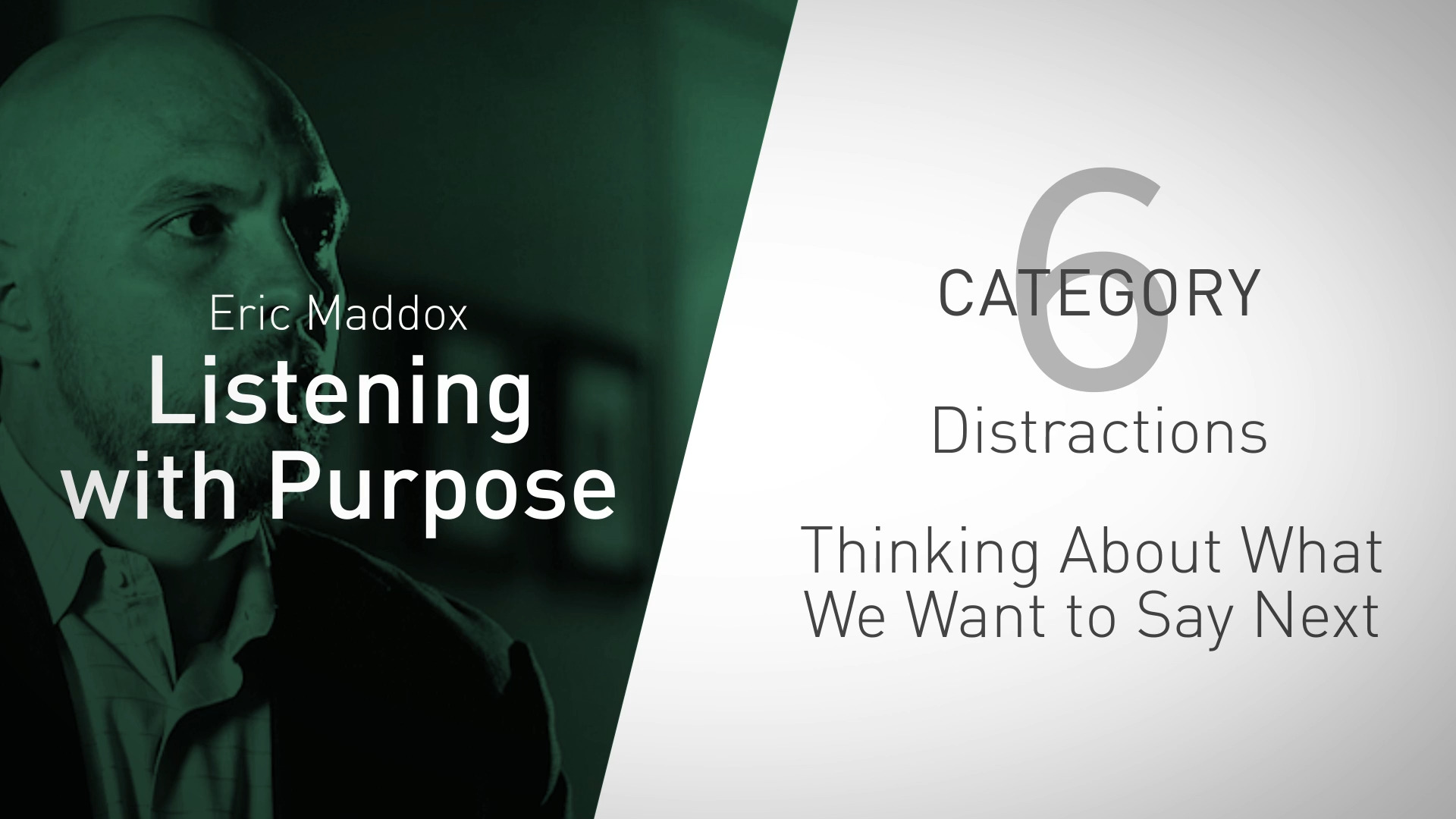Category 6 Distractions: Thinking About What We Want to Say Next
Rather than proving your worth, explore ways demonstrate that your focus in on your listeners.
Category six listening distraction, thinking about what we're going to say next in a conversation. We all do it, and we all do it a lot. Why? Because we're the lead in our own movie and we want our lead character to shine, to look smart, look competent, be able to solve problems. Why? Because we want to draw people to our stage. Our goal is to be competent, be that great leader, but we're going to do it on their stage. So every time when we think about what we're going to say next, we're basically saying, "What I'm going to say is more important than what you're saying right now." When somebody's communicating and we cut them off, even if we're like, "No, no, no, but let me jump in. There's something I've got to tell you," we are saying, "Listen, come over to my movie." We cannot forget the number one goal is to demonstrate we have a culture that we're always seeking to understand.
The other cool thing is when somebody talks to us, they know they've been going on a while. They're always going to finish with their most important point. Now if we know the most important breadcrumb is coming at the end, why on earth would we start thinking about what we're going to say halfway through? We always want to let them finish. Why? Because what they're saying on their stage is always more important than what we're about to say.
So we like the stages, but here's what I want you to do. I'm going to give you a little homework assignment between now and the next class. We have a little bit of time. I want you to watch conversations. Watch how individuals who like each other, be very nice to each other try to drag one another on their stage. Let me give you an example. Somebody's going to Paris and they're at a party or a function in a group of people and they're excited and they say, "Oh, I'm going to check something off my bucket list. My spouse and I, we're going to go to Paris. We're going there for two weeks." Somebody else says, Oh my goodness, "I used to live in Paris. I was there for three years. When you go to Paris, you've got to go to this place and you've got to go to the Louvre and you've got to trek out and there's a special restaurant," and they take over.
Now, if we ask the person who lived in Paris, they go, "I'm just trying to help. My goodness." Do they want help? I mean, basically you said you're only going there for two weeks. I lived there and look at all this cool stuff that I've done there. I want you to challenge yourself over the next couple weeks. Watch how many times you're in a conversation, you had an experience that is similar to what someone's talk about and don't even bring up the fact you did it. Every time that I meet with somebody, if they do not know who I am and they talk about the military, I will never, ever, ever talk about being in the military and capture Saddam Hussein. Why? Because they were in the military and they probably really proud of what they did. And what? I tracked down the most wanted guy in the world. How does that conversation go? That's just a grenade.
But now watch all conversations. Are we making it about them? Are we making it about us? Now, it would have been great if they said, "Hey, I'm going to Paris, my husband and I. My spouse and I are going for two weeks." And we said, "Really? That sounds amazing. What are you all going to do?" "Well, we haven't decided yet. We're thinking this." "Really? Of those three, which are you looking at more?" "We really have got to go have a toast on the Eiffel Tower," whatever. And they might say, "But I'm curious. I'm not sure how we get to this city, if we should take the train or rent a car." At that point you might say, "I know it sounds crazy. I used to live in Paris. If you have any questions." "Well, what would you recommend?" Now we're bringing your value. Now we're bringing your experiences, but we're doing it on their stage where they want it. Watch the stage battle that always competes and then realize, you're right, nobody ever really wants to get dragged to our stage, but they love it when we go to theirs.
For more information contact your MFS team at 1-800-343-2829.
Neither MFS nor any of its subsidiaries is affiliated with Eric Maddox. The views expressed are those of the speaker and are subject to change at any time.
FOR INVESTMENT PROFESSIONAL USE ONLY. Should not be shown, quoted, or distributed to the public.
MFS Fund Distributors, Inc., Member SIPC, Boston, MA
52928.2
